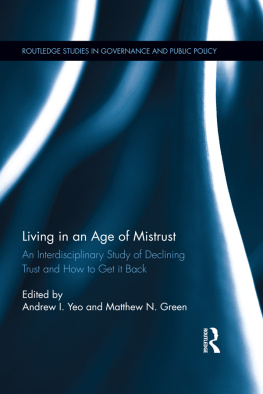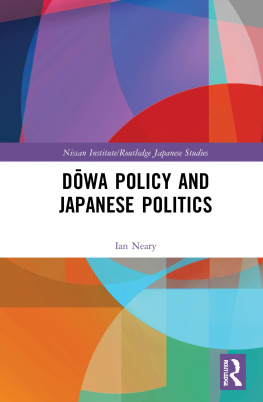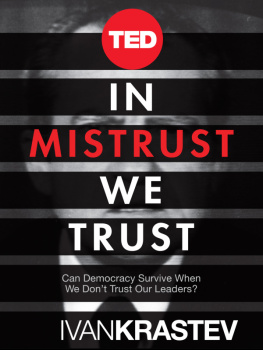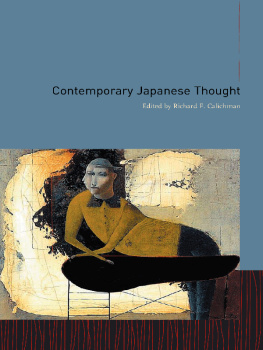
Trust and Mistrust in Contemporary Japanese Politics
This book offers a timely examination of the role of trust =N or lack thereof =N in contemporary Japanese politics. It portrays the political trust deficit prevalent in Japan through a unique range of case studies, illustrating how mistrust, rather than trust, impacts politics in Japan today. The first chapter introduces key trust concepts and the state of trust research on Japan. The second analyses voters trust levels in politics and parties and explores possible consequences of prevalent mistrust, including electoral volatility and instability in the party system. The following case study investigates the governments choices in rebuilding the Tohoku region, devastated by the 3/11 triple disaster of earthquake, tsunami and nuclear reactor meltdown in 2011. It highlights how policies eroded already low trust levels among Japanese citizens in their government. The next chapter explores Japanese consumer trust in food safety and related regulations in post-3/11 Japan, finding deficiencies in the governments risk communication. The fifth case study turns towards multiculturalism in educational policies and schooling practices, scrutinizing Japans readiness to face the challenge of trust-building between members of different ethnic groups. The final chapter illuminates the trust deficit in Japans relations with China, explaining how trust-building opportunities were missed in the past, leading to a continuous erosion of bilateral ties.
This book was originally published as a special issue of Japan Forum.
Kerstin Lukner is the Managing Director of the Alliance for Research on East Asia (AREA) Ruhr, a joint research and teaching institution of the universities of Duisburg-Essen and Bochum, Germany.
Alexandra Sakaki is a Research Fellow in the Asia division at the German Institute for International and Security Affairs (SWP) in Berlin, Germany.
Trust and Mistrust in Contemporary Japanese Politics
Edited by
Kerstin Lukner and Alexandra Sakaki
First published 2018
by Routledge
2 Park Square, Milton Park, Abingdon, Oxon, OX14 4RN, UK
and by Routledge
711 Third Avenue, New York, NY 10017, USA
Routledge is an imprint of the Taylor & Francis Group, an informa business
2018 BAJS
All rights reserved. No part of this book may be reprinted or reproduced or utilised in any form or by any electronic, mechanical, or other means, now known or hereafter invented, including photocopying and recording, or in any information storage or retrieval system, without permission in writing from the publishers.
Trademark notice: Product or corporate names may be trademarks or registered trademarks, and are used only for identification and explanation without intent to infringe.
British Library Cataloguing in Publication Data
A catalogue record for this book is available from the British Library
ISBN 13: 978-0-8153-6727-7
Typeset in Plantin
by RefineCatch Limited, Bungay, Suffolk
Publishers Note
The publisher accepts responsibility for any inconsistencies that may have arisen during the conversion of this book from journal articles to book chapters, namely the possible inclusion of journal terminology.
Disclaimer
Every effort has been made to contact copyright holders for their permission to reprint material in this book. The publishers would be grateful to hear from any copyright holder who is not here acknowledged and will undertake to rectify any errors or omissions in future editions of this book.
Contents
Citation Information
The chapters in this book were originally published in Japan Forum, volume 29, issue 1 (March 2017). When citing this material, please use the original page numbering for each article, as follows:
Chapter 1
Japans political trust deficit
Kerstin Lukner and Alexandra Sakaki
Japan Forum, volume 29, issue 1 (March 2017), pp. 118
Chapter 2
Party politics, elections and (mis-)trust in Japan
Ellis Krauss, Kuniaki Nemoto, Robert J. Pekkanen and Aiji Tanaka
Japan Forum, volume 29, issue 1 (March 2017), pp. 1938
Chapter 3
Trust deficit: Japanese communities and the challenge of rebuilding Tohoku
Daniel P. Aldrich
Japan Forum, volume 29, issue 1 (March 2017), pp. 3952
Chapter 4
Food safety and consumer trust in post-Fukushima Japan
Cornelia Reiher
Japan Forum, volume 29, issue 1 (March 2017), pp. 5376
Chapter 5
Multiculturalism and trust in Japan: educational policies and schooling practices
Gabriele Vogt
Japan Forum, volume 29, issue 1 (March 2017), pp. 7799
Chapter 6
The trust deficit in Sino-Japanese relations
Caroline Rose and Jan Skora
Japan Forum, volume 29, issue 1 (March 2017), pp. 100124
For any permission-related enquiries please visit: http://www.tandfonline.com/page/help/permissions
Notes on Contributors
Daniel P. Aldrich is Professor and Director of the Security and Resilience Program, at Northeastern University, USA.
Ellis Krauss is Professor Emeritus at the School of Global Policy and Strategy, University of California, USA.
Kerstin Lukner is the Managing Director of the Alliance for Research on East Asia (AREA) Ruhr, a joint research and teaching institution of the universities of Duisburg-Essen and Bochum, Germany.
Kuniaki Nemoto is Associate Professor in the Faculty of Economics, Musashi University, Japan.
Robert J. Pekkanen is Professor at the Henry M. Jackson School of International Studies, University of Washington, USA.
Cornelia Reiher is Junior Professor of Japanese Society, Institute of Japanese Studies, Freie Universitt Berlin, Germany.
Caroline Rose is Professor of Sino-Japanese Relations, University of Leeds, UK.
Alexandra Sakaki is a Research Fellow in the Asia division at the German Institute for International and Security Affairs (SWP), Berlin, Germany.
Jan Skora is Associate Professor, Vice-Director of the Institute of East Asian Studies and Head of Japanese Studies, Charles University, Prague, Czech Republic.
Aiji Tanaka is Professor in the School of Political Science and Economics, Waseda University, Japan.
Gabriele Vogt is Professor of Japanese Politics in the Institute for Asian and African Studies, University of Hamburg, Germany.
Japans political trust deficit
KERSTIN LUKNER AND ALEXANDRA SAKAKI
Abstract: This introductory article to the special issue on Trust and Mistrust in Contemporary Japan lays out key trust concepts used in social science research. It then turns towards the Japanese case, summarizing important research on the notion of trust and Japanese politics and society, according to which trust levels are comparatively low. The subsequent part provides an overview on the case studies that scrutinize issues related to political trust in particular. As the contributions invariably point to low levels of political trust, we finally reflect on problems in Japans politics in relation to the notion of trust.











